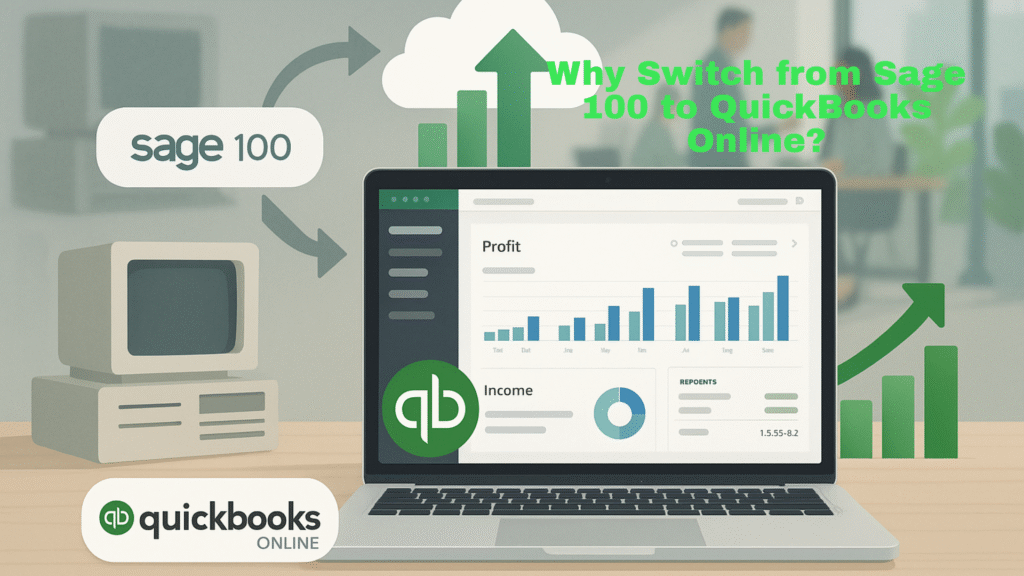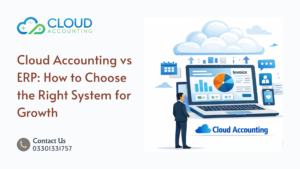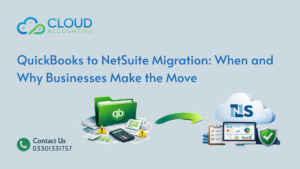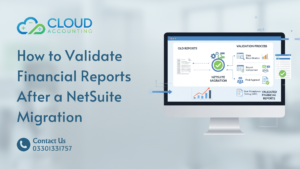Are you considering a switch from Sage 100 to QuickBooks Online? As a growing business, choosing the right accounting software is critical for staying competitive. Sage 100 has long been a reliable choice for small to medium-sized businesses (SMBs), particularly in industries like manufacturing, distribution, and wholesale. However, as your business expands, you may notice Sage 100 struggling to keep up with your needs.
This is where QuickBooks Online comes in. With its cloud-based features, user-friendly design, and robust integrations, QuickBooks Online is built to support growing businesses. In this blog, we’ll explore why switching from Sage 100 to QuickBooks Online is a smart move. We’ll compare their features, highlight key benefits, and share real-world examples of how QuickBooks Online transforms financial management. Plus, we’ll explain how Cloud Accounting, a leading UK accounting firm, can make your migration easy and secure. Ready to unlock your business’s potential? Let’s get started!
Why Businesses Are Moving Away from Sage 100
Sage 100 is a powerful accounting solution, especially for SMBs with complex operations. It handles tasks like inventory management, payroll, and financial reporting with ease. However, as businesses grow, they often encounter limitations that make Sage 100 less effective. Here are some common challenges:
- Complex Interface: Sage 100’s interface can be tricky to navigate, requiring extensive training for new users.
- Limited Integrations: It connects to fewer modern business tools, making it harder to sync with apps for CRM, e-commerce, or payroll.
- Desktop-Based Restrictions: Sage 100 is primarily an on-premise solution, limiting remote access and real-time collaboration.
- Scalability Issues: As transaction volumes increase, Sage 100 may slow down, impacting efficiency.
- High Maintenance Costs: On-premise software requires hardware, server upkeep, and IT support, which can be expensive.
Because of these challenges, many businesses are choosing QuickBooks Online as a modern alternative. Its cloud-based platform addresses Sage 100’s shortcomings while offering features designed for growth. So, what exactly makes QuickBooks Online the better choice? Let’s dive into the top benefits.
Top Benefits of Switching to QuickBooks Online
QuickBooks Online is a global leader in cloud accounting, trusted by millions of businesses. By switching from Sage 100, you can streamline your financial management and position your business for success. Here are the key advantages:
1. Cloud-Based Access for Flexibility
One of Sage 100’s biggest drawbacks is its desktop-based nature, which ties you to a specific computer or server. QuickBooks Online, however, operates entirely in the cloud. This means you can access your financial data anytime, anywhere, using any device with an internet connection.
For example, you can review reports at home, send invoices from a coffee shop, or check cash flow while traveling. Additionally, cloud access supports remote work, allowing your team to collaborate in real time from different locations. As a result, QuickBooks Online gives you the flexibility to manage your business on your terms.
2. Easy-to-Use Interface Saves Time
Sage 100’s complex interface often frustrates users, slowing down tasks and increasing training time. In contrast, QuickBooks Online is known for its intuitive, user-friendly design. Even employees with minimal accounting experience can learn it quickly.
For instance, creating an invoice, tracking expenses, or generating a report takes just a few clicks. Because of this, your team can work more efficiently, spending less time on software and more time on growth. Moreover, QuickBooks Online offers free tutorials, webinars, and support to help you get started.
3. Over 500 Integrations to Boost Efficiency
Integrations are critical for modern businesses, but Sage 100 offers limited options compared to QuickBooks Online. With over 500 integrations, QuickBooks Online connects seamlessly with popular tools, including:
- Payroll apps like Gusto or ADP.
- CRM platforms like Salesforce or HubSpot.
- E-commerce platforms like Shopify or WooCommerce.
- Inventory management tools like TradeGecko or Fishbowl.
These integrations automate tasks and sync data across your systems. For example, you can automatically import sales from Shopify into QuickBooks Online, eliminating manual data entry. Consequently, you save hours each week and reduce errors, allowing your business to run more smoothly.
4. Real-Time Reporting for Smarter Decisions
Growing businesses need accurate, up-to-date financial insights to stay ahead. While Sage 100 provides reporting, its desktop-based system can delay data updates. QuickBooks Online, on the other hand, offers real-time reporting that keeps you informed.
For instance, you can instantly view profit and loss statements, balance sheets, or cash flow reports. Additionally, customizable dashboards let you track key metrics, like unpaid invoices or monthly expenses, at a glance. This real-time visibility helps you spot trends, manage budgets, and make data-driven decisions with confidence.
5. Scalability for Growing Businesses
As your business grows, your accounting software must handle increased complexity. Sage 100 can struggle with high transaction volumes or large datasets, leading to performance issues. QuickBooks Online, however, is designed to scale with your business.
Whether you’re adding new locations, hiring staff, or increasing sales, QuickBooks Online keeps up. For example, its cloud infrastructure ensures fast performance, even with millions of transactions. Furthermore, features like multi-user access and role-based permissions make it easy to manage a growing team.
6. Multi-Currency Support for Global Expansion
If your business operates internationally, QuickBooks Online has a clear edge over Sage 100. Its multi-currency feature allows you to manage transactions in different currencies with ease. Exchange rates update automatically, ensuring accuracy.
This is particularly valuable for industries like distribution or manufacturing, where international suppliers and customers are common. For example, you can invoice a client in euros, pay a supplier in dollars, and track everything in your home currency. As a result, QuickBooks Online simplifies global operations and reduces manual work.
7. Cost-Effective for Long-Term Savings
Sage 100 often requires significant upfront costs for hardware, servers, and IT support, plus ongoing maintenance expenses. QuickBooks Online, however, is subscription-based, with no need for costly infrastructure. You pay a predictable monthly fee that includes updates, backups, and security.
Additionally, QuickBooks Online’s automation features—like bank feeds, recurring invoices, and expense tracking—reduce manual tasks. For instance, reconciling bank transactions can take minutes instead of hours. Over time, these efficiencies lead to substantial cost savings, making QuickBooks Online a budget-friendly choice.

Sage 100 vs. QuickBooks Online: A Side-by-Side Comparison
To help you decide if switching is right for your business, here’s a comparison of Sage 100 and QuickBooks Online:
| Feature | Sage 100 | QuickBooks Online |
| Deployment | Desktop-based, on-premise | Cloud-based, accessible anywhere |
| Ease of Use | Complex, steep learning curve | Intuitive, user-friendly |
| Integrations | Limited (under 100 apps) | Over 500 integrations |
| Reporting | Delayed, manual updates | Real-time, customizable dashboards |
| Scalability | Limited for high transaction volumes | Scales with business growth |
| Multi-Currency | Basic support, manual adjustments | Robust, automatic exchange rate updates |
| Cost | High upfront and maintenance costs | Affordable subscription, no hardware |
As you can see, QuickBooks Online outperforms Sage 100 in flexibility, scalability, and ease of use, making it ideal for growing businesses.
Real-World Examples: How QuickBooks Online Drives Success
To illustrate the impact of switching, let’s look at two hypothetical businesses that migrated from Sage 100 to QuickBooks Online with Cloud Accounting’s help:
- Case Study: Growing Distribution Company
- Challenge: A distribution company struggled with Sage 100’s slow reporting and lack of e-commerce integrations, making it hard to track sales and inventory.
- Solution: After migrating to QuickBooks Online, they integrated with Shopify to sync sales data automatically. Real-time reports helped them monitor inventory levels and cash flow.
- Results: The company saved 15 hours per week on bookkeeping, improved decision-making, and increased sales by 20% within six months.
- Case Study: Manufacturing Business
- Challenge: A manufacturer with international suppliers found Sage 100’s multi-currency features cumbersome, leading to errors in invoicing.
- Solution: QuickBooks Online’s multi-currency support streamlined their global transactions, and cloud access allowed remote collaboration.
- Results: They reduced invoicing errors by 90% and improved supplier relationships, supporting their international expansion.
These examples show how QuickBooks Online empowers businesses to overcome Sage 100’s limitations and achieve their goals.
Why Partner with Cloud Accounting for Your Migration?
Migrating from Sage 100 to QuickBooks Online may seem overwhelming, but Cloud Accounting makes it simple and secure. As one of the UK’s top accounting firms, we specialize in tailored migrations that minimize disruptions. Here’s how we help:
- Custom Planning: We assess your Sage 100 setup and create a migration plan that fits your business.
- Secure Data Transfer: We safely move your transactions, contacts, and reports, ensuring no data loss.
- QuickBooks Setup: We configure your chart of accounts, tax codes, and integrations for a smooth start.
- Training and Support: We provide training for your team and ongoing support to answer questions.
Because we handle every step, you can focus on running your business while we manage the transition. With Cloud Accounting, your switch to QuickBooks Online is worry-free.
Frequently Asked Questions (FAQs)
To address common concerns, here are answers to questions businesses often ask about switching from Sage 100 to QuickBooks Online:
1. How long does it take to migrate from Sage 100 to QuickBooks Online?
The timeline depends on your data complexity, but most migrations take 1–3 weeks. Cloud Accounting ensures a fast, accurate process with minimal downtime.
2. Will I lose any data during the migration?
No. Cloud Accounting uses secure methods to transfer all your data, including transactions, contacts, and reports, with thorough verification to ensure accuracy.
3. Can QuickBooks Online handle my industry’s needs?
Yes. QuickBooks Online supports industries like manufacturing, distribution, retail, and more, with integrations and features tailored to your needs.
4. What happens after the migration?
Cloud Accounting provides training to help your team use QuickBooks Online effectively, plus ongoing support to address any issues.
Ready to Switch to QuickBooks Online?
Switching from Sage 100 to QuickBooks Online is a game-changer for growing businesses. With its cloud-based access, easy-to-use interface, and powerful integrations, QuickBooks Online streamlines your financial management and supports your expansion. Whether you need real-time reporting, multi-currency support, or cost savings, QuickBooks Online delivers the tools to succeed.
At Cloud Accounting, we’re here to make your migration smooth and stress-free. Our expert team will guide you every step of the way, from planning to training, so you can start enjoying QuickBooks Online’s benefits right away. Don’t let Sage 100 hold your business back—take the first step toward growth today.
Book a free discovery call with Cloud Accounting now to discuss your Sage 100 to QuickBooks Online migration. Let’s transform your financial management together!








